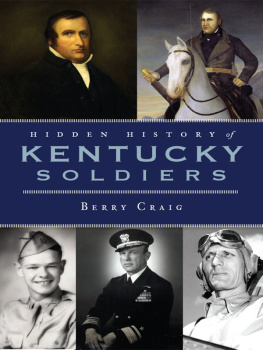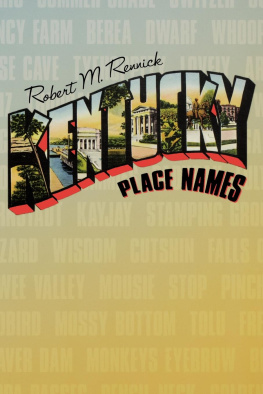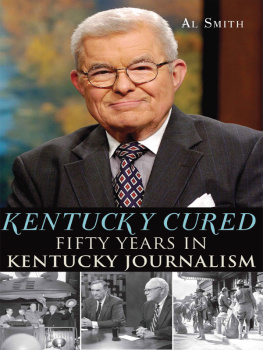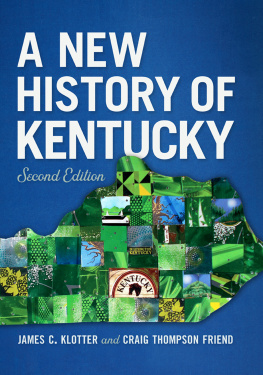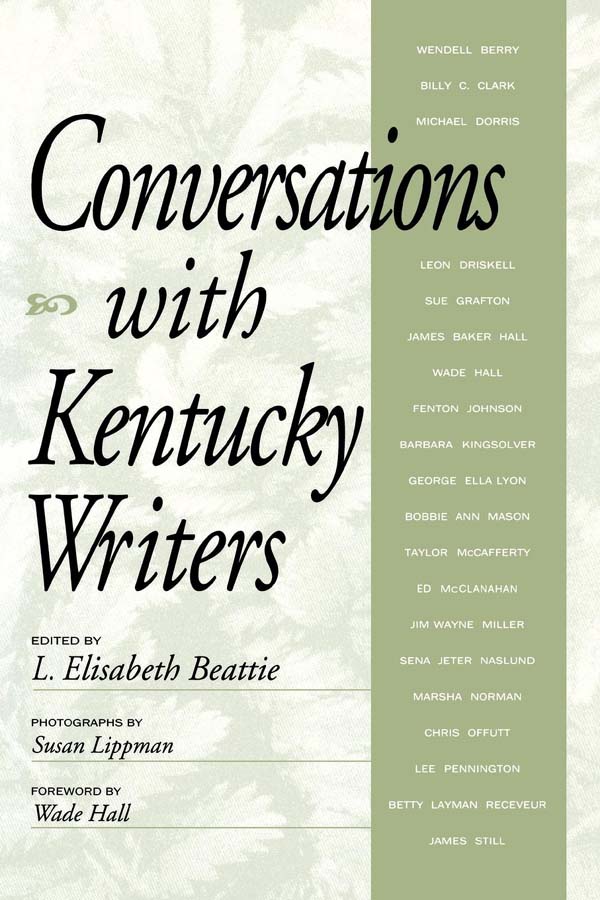KENTUCKY
Remembered
An Oral History Series
James C. Klotter
and
Terry L. Birdwhistell
General Editors
Conversations
with
Kentucky Writers
L. Elisabeth Beattie, Editor
Photographs by Susan Lippman
With a Foreword by Wade Hall

Copyright 1996 by The University Press of Kentucky
Scholarly publisher for the Commonwealth,
serving Bellarmine University, Berea College, Centre
College of Kentucky, Eastern Kentucky University,
The Filson Historical Society, Georgetown College, Kentucky
Historical Society, Kentucky State University,
Morehead State University, Murray State University,
Northern Kentucky University, Transylvania University,
University of Kentucky, University of Louisville,
and Western Kentucky University.
All rights reserved.
Editorial and Sales Offices: The University Press of Kentucky
663 South Limestone Street, Lexington, Kentucky 40508-4008
03 04 05 06 07 5 4 3 2 1
Library of Congress Cataloging-in-Publication Data
Conversations with Kentucky writers / L. Elisabeth Beattie, editor;
photographs by Susan Lippman; with a foreword by Wade Hall.
p. cm. (Kentucky remembered)
Includes bibliographical references and index.
ISBN: 978-0-8131-9043-3
1. American literatureKentuckyHistory and criticismTheory, etc.
2. American literature20th centuryHistory and criticismTheory, etc.
3. Authors, American20th centuryInterviews. 4. KentuckyIntellectual
life20th century. 5. Authors, AmericanKentuckyInterviews.
6. KentuckyIn literature. 7. Authorship.
I. Beattie, L. Elisabeth, 1953- . II. Series.
PS266.K4C66 1996
810.99769dc20 95-54206
To the Memory of Leon Vinson Driskell
writer, teacher, mentor, friend
1932-1995
With love
Contents
General Editors Preface
In the field of oral history, Kentucky is a national leader. Over the past several decades, thousands of its citizens have been interviewed. Kentucky Remembered brings into print the most important of those recollections, with each volume focusing on a particular subject.
Oral history is, of course, only one type of source material. Yet by the very personal nature of recollection, hidden aspects of history are often disclosed. Oral sources provide a vital thread in the rich fabric that is Kentucky history.
This volume is the third in the series and, unlike the first two works, focuses on several people rather than one individual. It is a much-needed book, for the Commonwealths literary tradition is one of its strengths. For more than a century, from the time of James Lane Allen, Kentucky has produced and nurtured many major writers and poets. All too often their contributions have been overshadowed by colorful politics, feud violence, or other matters that have gained national attention. Yet writers have long been a vital part of the makeup of the Commonwealth, and the stories of their lives need to be told. Conversations with Kentucky Writers shows that, although variety may be a common feature among those interviewed, in the end they share a commitment to their profession and a talent for the written word.
These interviews tell of lives of hardship and success, of happiness and sorrow, of injustices and rewards. The accounts of these Kentucky writers, many of them national figures, help us to understand those who, through their exploration of the psyche of Kentucky, tell us also more about ourselves.
Foreword
Many years before I had the good sense to move here, I imagined Kentucky as a historical gallery containing the likes of Daniel Boone, Henry Clay, Floyd Collins, Alben Barkley, Abe Lincoln, and Jeff Davis. Furthermore, I knew that the states wonderland of fiction included Mrs. Wiggs, Aunt Jane, Judge Priest, the Little Colonel, Private Tussie, and Mr. Belvedere. After I arrived and got to know Kentucky up close, I realized that my imagination was not nearly rich and broad enough for the wonders I found, in fact and in fiction.
What makes Kentucky so important historically and culturally? Perhaps its the same limestone in the soil and water that produces superior Thoroughbreds. Perhaps its the delightful climate, with four distinct seasons. Perhaps its Kentuckys border-state location that has made it a crossroads of the nationa place of division, decision, and sometimes violence. Perhaps Kentucky is a kind of no-mans-land where tension is the natural law that at once separates and unites, providing ultimately a glue that gives life and literature their texture and meaning. Whatever the reasonsand, of course, they are a combination of these and moreKentucky has contributed a goodly portion to the nations history and literature.
This gathering of conversations with Kentucky writers, expertly conducted and edited by L. Elisabeth Beattie, is good evidence that Kentuckys cultural resources are still abundant. Indeed, this sampling of Kentuckys many fine writers shows the continuing vitality of a literary renaissance that began in the 1930s and 1940s with such major figures as Robert Penn Warren, Allen Tate, Caroline Gordon, Elizabeth Madox Roberts, Janice Holt Giles, Harriette Arnow, Jesse Stuart, and James Still.
If theres anything writers like to do more than write, its talk about themselves and their writing. In these conversations Beattie gives them that opportunity. All memory is selective and distorted, of course, and some people invent and reinvent themselves each time they tell their past. Its an invitation to become the hero of your own life. Whether writing novels or histories, writers are constantly dealing with the fine line between fiction and biography. When they become their own subjects, the blurring of fact and imagination can become more pronounced. As Chris Offutt warns us in his interview, Once you remember one thing, then the next time you remember it, you dont remember the event, you remember the memory of the event. So if you remember something ten times, you know youre remembering a memory of a memory of a memory. The most recent memory becomes the truth.
Some people, of course, intend to reshape themselves into what they consider a more fitting image for public consumption. But the interview format, with follow-up questions and probes by a well-prepared interviewer, does not allow for elaborate charades. What you get in these conversations is essentially the truth, or as close to it as we are likely to get in autobiographical form. And the result is a colorful, living mosaic of human lives from people who are in the business of telling good stories.
Of the twenty authors in this collection, only two (James Still and Billy C. Clark) were born before 1930. Eight were born during the thirties, seven in the forties, and three in the fifties. Fourteen were born in Kentucky, three in Alabama, and one each in North Carolina, Georgia, and Maryland. Almost half were either reared on farms or had protracted rural exposure while growing up. At least thirteen are, or have been, teachers in some capacity, usually on college campuses. Almost all have college degrees, and most have degrees at the masters or doctoral level. Although few believe that it does much to help one become a writer, most have taken some formal instruction in creative writing.
All twenty writers have spent large chunks of lives in Kentuckyindeed, at least a fourth of them have lived almost their entire lives hereand they all agree that their books, obviously or indirectly, have been significantly influenced by their Kentucky experience. Bobbie Ann Mason, James Still, Barbara Kingsolver, Sue Grafton, and Wendell Berryto name a feware read and respected wherever good writing is cherished. Betty Layman Receveurs recent historical novels about Kentucky have been translated into several foreign languages.


